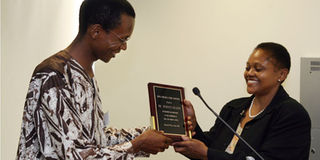US urge Kenya to pursue reforms

Prof Kefa Otiso, president of the Kenya Scholars and Studies Association presents a plaque to Assistant US Secretary of State for African Affairs Jendayi Frazer in recognition of her efforts to help resolve the country's post-election crisis. Photo/KEVIN KELLY
What you need to know:
- Development and stability in Kenya hinge on the coalition government’s ability to change the political culture.
Reforms key in addressing inequalities that cut across ethnic, geographic, and socio-economic fault lines in Kenya.
US-Kenya relations to be affected by the government’s response to these ills.
Development and stability in Kenya hinge on the coalition government’s ability to change the political culture, a Kenyan gathering of scholars heard at the weekend
“Constitutional, electoral, and land reforms are essential for the nation to move forward,” said Jendayi Frazer, Assistant Secretary of State for African Affairs.
“These reforms are key in addressing inequalities that cut across ethnic, geographic, and socio-economic fault lines in Kenya.”
Ms Frazer was delivering the keynote address at the inaugural conference of the US-based Kenya Scholars and Studies Association (Kessa), held on Friday and Saturday at Bowling Green University in Ohio State.
The post-election violence -triggered by a disputed presidential election- came under focus at the conference. At least 1,000 people were killed and 350,000 others left homeless in the violence.
The violence earlier this year “revealed the stark weaknesses in Kenya’s social fabric; the reaction to it from many ordinary citizens showed its strength,” Ms Frazer said.
Formation of the grand coalition offers Kenya “an historic opportunity to strengthen democratic institutions and initiate the reform process necessary to address the complex and deep-rooted sources of the crisis.”
Ms Frazer was blunt in describing the challenges Kenya faces.
She cited “endemic corruption, persistent poverty, glaring disparities of wealth, severe environmental degradation, gender inequality and the health crisis related to HIV and Aids and malaria.”
US-Kenya relations will be profoundly affected by the government’s response to these ills, Ms Frazer said.
“At this juncture in Kenya’s history,” she added, “the US is standing together with the Kenyan people in echoing their calls for peace, reconciliation, and reforms to redress the structural and social inequalities that fuelled the recent crisis.”
The Kessa conference proved “quite successful,” according to Professor Kefa Otiso, co-founder and president of the organisation.
The 70 academics in attendance called for members of the Diaspora to “take the lead in forging a Kenyan national identity that can help to heal and unite the country.”




